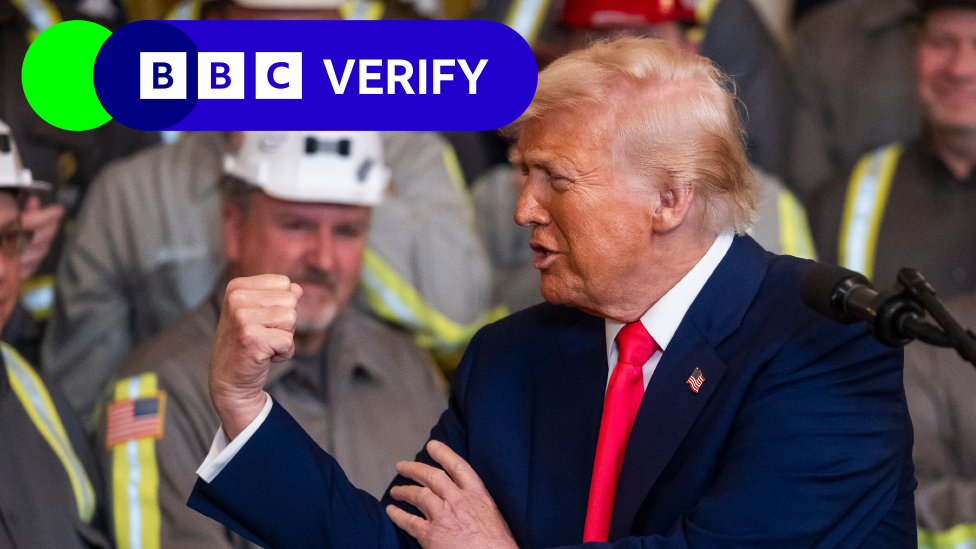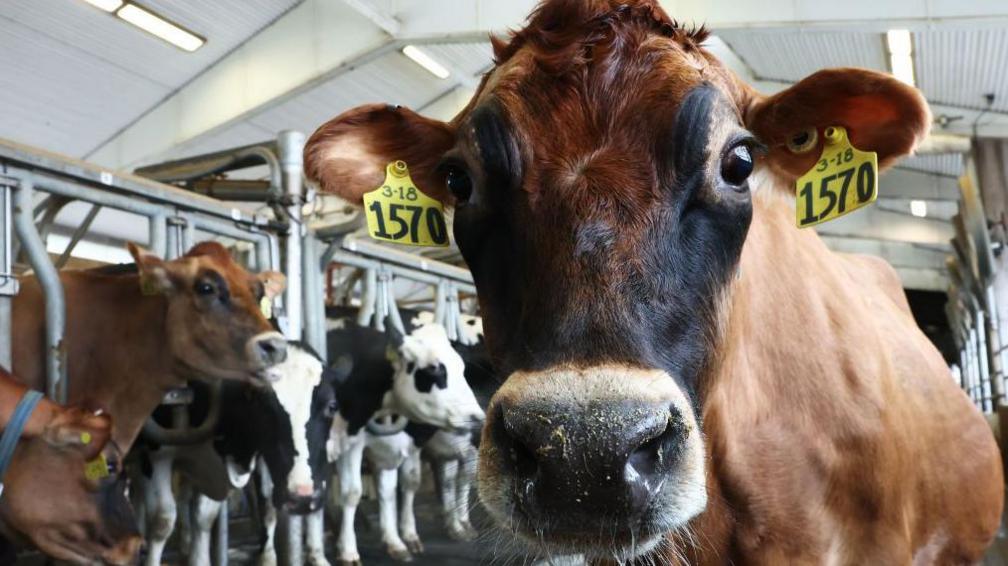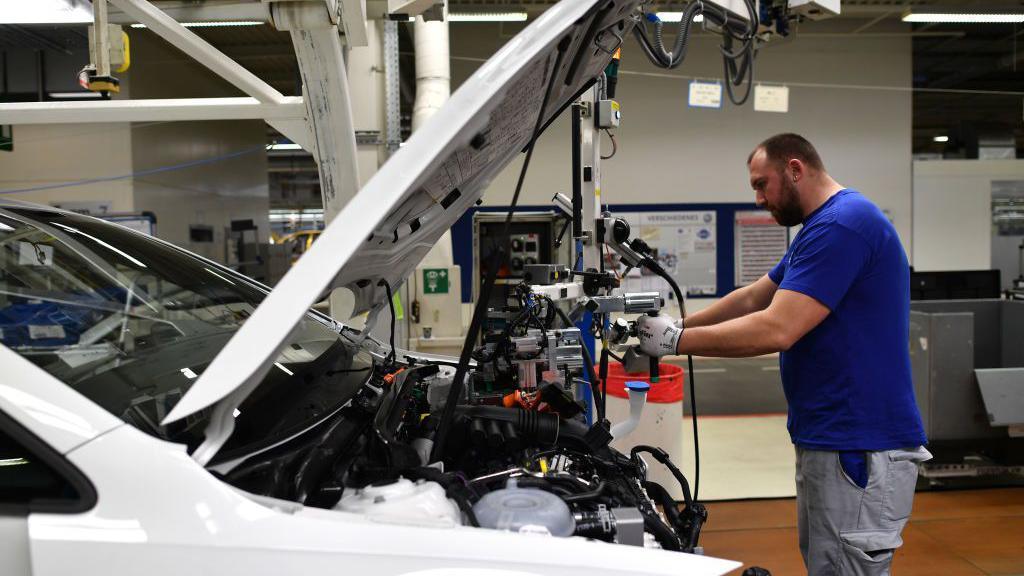Is the US making $2bn a day from tariffs? Trump claims fact-checked

- Published
President Donald Trump has announced sweeping changes to his import tax regime to allow time for trade talks.
A 90-day pause will be applied to countries that were facing tariffs over the 10% baseline. China, however, will see an even larger hike with tariffs on its imports rising to 125%.
President Trump had been justifying his tariffs with a series of claims about how the US is the victim of "unfair trade".
However, several of his claims about global trade were unsubstantiated or even false. BBC Verify has been taking a closer look.
Is the US making $2bn a day from tariffs?
Before the 90-day pause, Trump claimed "we're making a fortune with tariffs - $2bn a day".
He made the claim on Tuesday, one day before the pause. Trump then repeated the figure in front of reporters following the latest changes, saying "we're now making $2bn a day" - although he did not specifically link the number to tariffs.
But BBC Verify cannot find any published figures which show this.
The US Treasury Department publishes a daily statement, external on how much money from customs duties goes to the federal government.
Data from 8 April - which includes the impact of some of Trump's earlier tariffs - amounted to $192m (£149m).
That figure is well short of Trump's claim.
It is possible that he has based his claim on forecasts for the year ahead.
The US imported $9bn (£7bn) worth of goods per day last year, external.
Some analysts have calculated that the average rate of Trump's tariffs - after the initial announcement - was 22%.
Applying this to these import figures would get you to $2bn (£1.6bn) a day.
But this calculation assumes that the volume of US imports would stay at this level.
Another way Trump could have reached his figure is by basing it on what his trade advisor said on 6 April - when the global tariffs were initially announced.
Peter Navarro claimed the tariffs would raise $700bn (£546bn) a year, external and - from this - you can get to around $2bn a day.
It is not clear how Navarro came up with his figure and analysts have since argued that it could be much lower.
BBC Verify has asked the White House for Trump's evidence.
Is the US running a $1 trillion deficit with China?
A trade deficit happens when a country buys more from another country than it sells to it and Trump claims the US has a huge one with China.
"We have a trillion dollar trade deficit with China", Trump told reporters on 7 April.
The US does have a large trade deficit in goods with China.
Official figures show it was just over $295bn (£230bn) in 2024 , external- which is far less than the $1tn (£780bn) claimed by Trump.
Globally, in 2024, China exported nearly $1tn (£780bn) more goods than it imported, external.
But, contrary to what Trump said, that figure applies to all countries, not just the US.
Does Canada charge 270% on US dairy products?
Trump has claimed that Canada charges US farmers a 270% tariff on their dairy products.
"Canada charges for our dairy products 270%. Nobody knows that. They charge you 2% for the first two cartons of milk and after that you go up to 270," Trump said.
It is correct that Canada does impose high tariffs on US dairy products - including 241% for milk, 270% for dairy powder and 298% for butter, external - but they only apply under specific conditions.
Under the Canadian system, US dairy goods can enter the country duty-free or with very low tariffs - until certain quotas are exceeded, external. Once this happens, higher tariffs are applied.

A tariff war could create uncertainly for American dairy farmers
According to the US Department of Agriculture (USDA), the US exported $1.14bn (£892m) worth of dairy products to Canada in 2024, external.
Despite the volume of trade between the two countries, the International Dairy Foods Association (IDFA) - which represents America's dairy industry - said "the US has never gotten close" to exceeding the quotas, external.
The IDFA has, however, supported Trump challenging Canada's approach, saying that tariff quotas as well as Canada's milk pricing policy was distorting trade, external. But it also said a tariff war would "create uncertainly and additional costs for American dairy farmers".
Trade expert David Henig, from the European Centre for International Political Economy, told BBC Verify that Canada is highly protective of its dairy market, but pointed out that "President Trump actually negotiated the most recent trade deal between Canada and the US".
Trump also claimed Canada charges higher tariffs after the "first two cartons of milk". Al Mussell, from Agri-Food Economic Systems, told BBC Verify that tariff-quotas are typically measured in tonnes.
"I suppose the president was joking but in any event, it's not a couple of cartons", he said.
Does the EU import no US cars?

Trump is exaggerating when he says that the EU takes "no" cars.
As well as China, Trump singled out the European Union (EU) which he said had been formed "to screw the United States".
"You know, we take their millions of cars. They take no cars. They don't take our farm products. They don't take anything", he said.
While the US imports more cars from the EU than it exports to it, Trump's claim that they take no cars is false.
In 2024, the EU imported 164,857 US-made cars valued at €7.7bn (£6.6bn), according to the European Automobile Manufacturers' Association (ACEA), external.
Many more did go the other way - 749,170 EU-made cars were exported to the US last year valued at €38.5bn (£33.3bn).
Trump's claim about farm products is also false.
The EU bought $12.8bn (£10bn) of US agricultural exports in 2024, making the EU America's fourth largest export market - according to the USDA. , external
BBC Verify will be looking at more trade claims.
